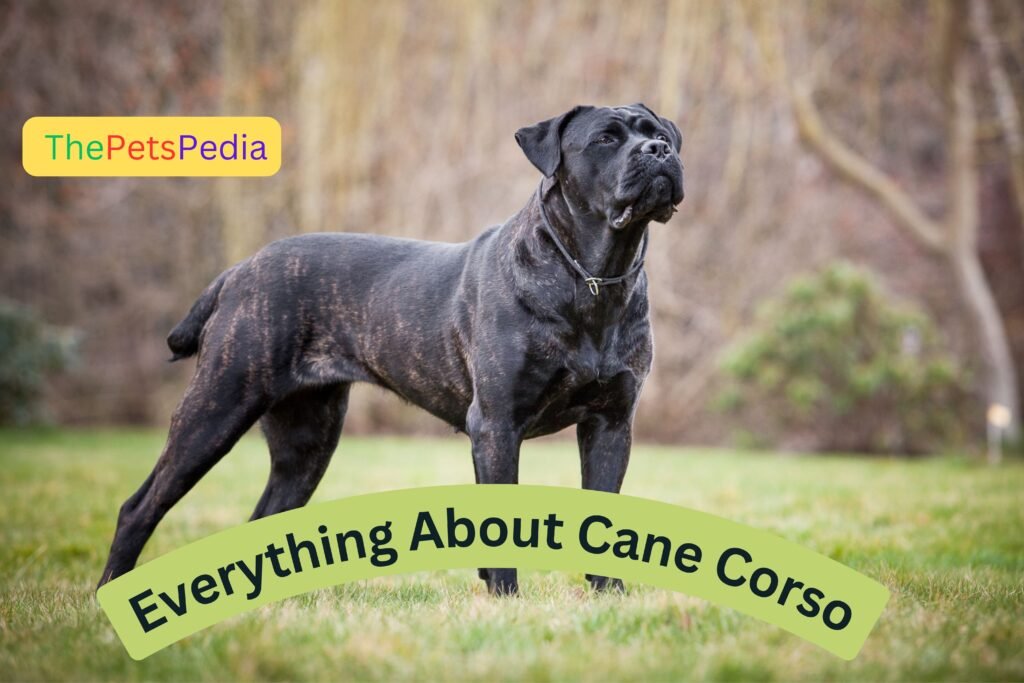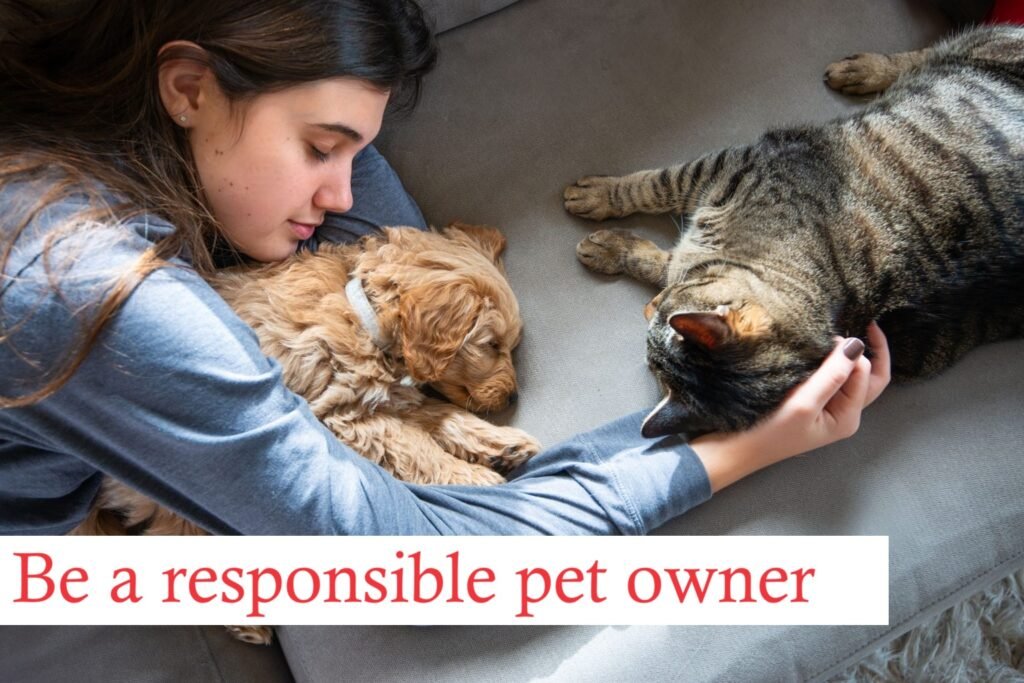The Cane Corso is a large and powerful breed known for its loyalty and intelligence. With its majestic appearance and strong build, this dog has become popular among pet Cane Corso owners who want a protective and affectionate companion. This article will explore everything you need to know about the Cane Corso, including its history, characteristics, care needs, and health concerns.
Overview of Cane Corso
| Characteristic | Details |
|---|---|
| Weight | 88-120 pounds (40-54 kg) |
| Height | 24-28 inches (61-71 cm) |
| Coat Type | Short, stiff, and dense |
| Coat Colors | Black, fawn, gray, brindle, and other variations |
| Eye Color | Dark amber or brown |
| Personality | Loyal, intelligent, and protective |
| Activity Level | High; requires regular exercise |
| Grooming Needs | Minimal; regular brushing recommended |
| Health Concerns | Hip dysplasia, heart issues, and obesity |
| Lifespan | 10-12 years with proper care |
A Brief History of the Cane Corso
The dog has a rich history that dates back to ancient Rome. This dog was used as a working animal for hunting, guarding, and protecting livestock. Its name “Cane Corso” comes from the Italian word “Cane,” meaning dog, and “Corso,” which refers to its heritage as a guard dog.
“The Cane Corso is not just a breed; it’s a living piece of history, embodying the spirit of ancient Roman working dogs.” — Renowned Dog Historian
During the Middle Ages, this dog breed was essential in farms and homes to protect against intruders and wild animals. However, their numbers declined after World War II as their roles diminished. Fortunately, dedicated breeders worked to revive this magnificent breed, and today, they are celebrated as a loving family pet and protector.
Physical Characteristics
Size and Weight
The Cane Corso is a large and muscular dog. Males typically weigh between 100-120 pounds (45-54 kg), while females weigh slightly less, around 88-100 pounds (40-45 kg). Their height ranges from 24 to 28 inches (61-71 cm) at the shoulder. Despite its size, this is agile and strong, making it an excellent working dog.
Coat and Color
The Cane Corso has a short, stiff coat that is easy to maintain. Its coat can come in various colors, including:
| Color | Description |
|---|---|
| Black | Solid black dogs are common and striking. |
| Fawn | A light tan color that can vary in shade. |
| Brindle | A mix of fawn and black stripes, giving it a unique appearance. |
| Gray | A beautiful solid or diluted gray. |
Eyes and Expression
The eyes of a Cane Corso are dark amber or brown, giving it an intelligent and confident look. The large, expressive eyes can convey a wide range of emotions, from playfulness to protectiveness.
Ears and Tail
Cane Corsos typically have cropped ears, which is a practice some pet owners prefer for aesthetics and to enhance their protective nature. However, ear cropping is not necessary and can be a personal choice. The tail is often docked for similar reasons, but it’s essential to remember that leaving the tail intact is also acceptable.
Personality and Behavior
The Cane Corso dog breed is known for its loyal and protective nature. It bonds closely with its family and can be wary of strangers. Here are some key personality traits:
Loyal and Devoted
This dog breedis fiercely loyal to its family. It will go to great lengths to protect loved ones and makes an excellent guard dog. Its loyalty makes it a great companion for families, as it thrives on human interaction and loves to be included in activities.
“The Cane Corso’s loyalty is unparalleled; it will protect its family with its life.” — ThePetsPedia.com
Intelligent and Trainable
This is highly intelligent and eager to learn. With proper training and socialization, this dog can excel in obedience and agility. Consistent training sessions with positive reinforcement will help it become a well-behaved member of the family.
Playful and Energetic
While the Cane Corso is known for its protective instincts, it also has a playful side. It enjoys interactive games and physical activities, so it’s essential to provide regular exercise to keep it happy and healthy. Activities such as fetch, tug-of-war, and daily walks are great for burning off energy.
Socialization Needs
Early socialization is crucial for the Cane Corso. Exposing it to different environments, people, and other animals helps it develop into a well-rounded dog. This practice reduces the likelihood of aggressive behavior and ensures comfort in various situations.
Caring for Your Cane Corso
Grooming Needs
The Cane Corso has low grooming requirements due to its short coat. Regular brushing helps remove loose hair and dirt, while bathing as needed keeps its coat clean and healthy. Pay special attention to its ears, as they can accumulate dirt and wax, requiring occasional cleaning.
Nutrition and Diet
A balanced diet is essential for the Cane Corso’s health. High-quality dog food that meets its nutritional needs will help it grow strong and stay healthy. Consider the following tips for feeding your pet Cane Corso:
| Feeding Tips | Details |
|---|---|
| High-Quality Food | Choose a brand that offers quality ingredients and meets AAFCO standards for nutrition. |
| Caloric Needs | The Cane Corso may require more calories than smaller breeds due to its size and activity level. Monitor its weight and adjust portions as needed. |
| Fresh Water | Always provide access to clean, fresh water to keep it hydrated. |
Exercise Requirements
The Cane Corso is an energetic dog that requires regular exercise to stay healthy and happy. Daily walks, playtime in the yard, and mental stimulation through training or puzzles will keep it active. Consider incorporating activities like running or hiking, as it enjoys being outdoors.
Health Considerations
While the Cane Corso is generally a healthy dog, it can be prone to certain health issues. Regular veterinary check-ups are essential for early detection and prevention of problems.
Common Health Issues:
| Health Issue | Description |
|---|---|
| Hip Dysplasia | A genetic condition affecting the hip joint, leading to arthritis. Maintaining a healthy weight and providing joint supplements may help manage this condition. |
| Heart Problems | The Cane Corso is susceptible to heart diseases, such as dilated cardiomyopathy. Regular vet visits can monitor its heart health. |
| Obesity | Due to its size, the Cane Corso can easily become overweight. Ensure it receives proper exercise and a balanced diet to maintain a healthy weight. |
Lifespan and Quality of Life
The Cane Corso typically lives between 10 and 12 years. Providing it with proper care, a nutritious diet, regular exercise, and veterinary check-ups can help it live a long and healthy life. Its strong bond with families makes it a loving companion, and a happy home environment contributes significantly to its overall well-being.
Socialization and Training
Early Socialization
Socializing your Cane Corso from a young age is crucial. Introduce it to different people, pets, and environments to help it grow into a well-adjusted adult. Positive experiences will build its confidence and reduce anxiety in new situations.
Basic Training
The Cane Corso is an intelligent and responsive pet, making it trainable. Start with basic commands like sit, stay, and come. Use positive reinforcement, such as treats and praise, to encourage good behavior. Consistent training sessions will help establish a strong bond between you and your dog.
Advanced Training
Once your Cane Corso has mastered basic commands, consider advanced training. Obedience classes, agility training, or even scent work can provide mental stimulation and strengthen its skills. These activities will keep it engaged and satisfied.
Living Standards for Cane Corsos
Home Environment
The Cane Corso thrives in a loving and structured environment. It can adapt to various living situations, but an ideal home should provide enough space for it to move around comfortably.
Warmth and Comfort
Cane Corsos enjoy warmth and comfort, so provide cozy spots with blankets or dog beds. They should not be left outdoors for long periods, as they are sensitive to extreme weather conditions.
Safety and Security
Ensure your home is safe and secure for your Cane Corso. A well-fenced yard is essential to prevent it from wandering off. Keep hazardous items out of its reach and create a safe space for it to relax.
Compatibility with Other Pets
This loyal breed can get along with other pets if properly socialized from an early age. Monitor interactions with smaller animals, as its strong prey drive may lead to chasing or rough play. Training and supervision can help create a harmonious environment.
Finding a Cane Corso
Choosing a Reputable Breeder
When looking for a pet Cane Corso, finding a reputable breeder is essential. Look for breeders who prioritize health testing and have a good reputation in the breed community. Here are some tips to consider:
| Key Considerations | Details |
|---|---|
| Health Clearances | Ask for health tests for the puppy’s parents to minimize genetic health issues. |
| Temperament Testing | Observe the temperament of the puppy and its parents to ensure they align with your needs. |
| Living Conditions | Visit the breeder’s facility to ensure the dogs are well cared for in a clean environment. |
Adoption Options
They can also be found in shelters and rescue organizations. Consider adopting a dog in need of a home. Research local rescues specializing in the breed to find a suitable match.
Tips for Cane Corso Owners
- Start Training Early: Begin training and socialization as soon as you bring your Cane Corso home to establish good habits.
- Provide Mental Stimulation: Use puzzle toys and interactive games to keep your mind sharp and prevent boredom.
- Stay Consistent: Use consistent commands and routines to help your pet dog understand expectations.
- Be Patient: Some dogs may take time to adjust. Be patient and gentle as they learn and adapt.
- Regular Vet Visits: Schedule regular check-ups to monitor its health and catch any issues early.
Fun Facts about Cane Corsos
- Ancient Roots: This is a descendant of the Roman war dog, the Canis Pugnax, known for its strength and bravery.
- Natural Protectors: They are often used as guard dogs for homes and properties due to their protective instincts.
- Strong Bonds: The Cane Corso is known for forming strong bonds with its family and can be quite affectionate.
- Highly Trainable: They excel in obedience training and can be taught various tasks and tricks.
- Versatile Working Dogs: Besides being family pets, they can also participate in search and rescue, therapy work, and other canine sports.
Conclusion
The Cane Corso is a remarkable dog that offers loyalty, protection, and companionship. With its strong personality and loving nature, it makes an excellent family pet. Understanding its needs and providing proper care will ensure it thrives in your home. Whether you choose to adopt or purchase a pet Cane Corso, you will gain a devoted companion for years to come.
FAQs
1. Are Cane Corsos good family pets?
Yes, Cane Corsos can make excellent family pets. They are loyal, protective, and affectionate towards their families. Proper training and socialization are key to ensuring they are well-adjusted and comfortable around children and other pets.
2. How much exercise does a Cane Corso need?
Cane Corsos require regular exercise to stay healthy and happy. Aim for at least one hour of physical activity each day, including walks, playtime, and mental stimulation activities.
3. Do Cane Corsos shed a lot?
They have a short coat that sheds moderately throughout the year. Regular brushing will help manage loose hair and keep their coat healthy.
4. Are Cane Corsos aggressive?
Cane Corsos are not inherently aggressive but can be protective of their families. Proper socialization and training from an early age can help prevent any aggressive tendencies and ensure they are well-mannered.
5. How can I find a reputable Cane Corso breeder?
Look for breeders who prioritize health testing and have a good reputation in the breed community. Visiting the breeder’s facility, asking for references, and ensuring they provide a safe and clean environment for their dogs are essential steps in finding a responsible breeder.



